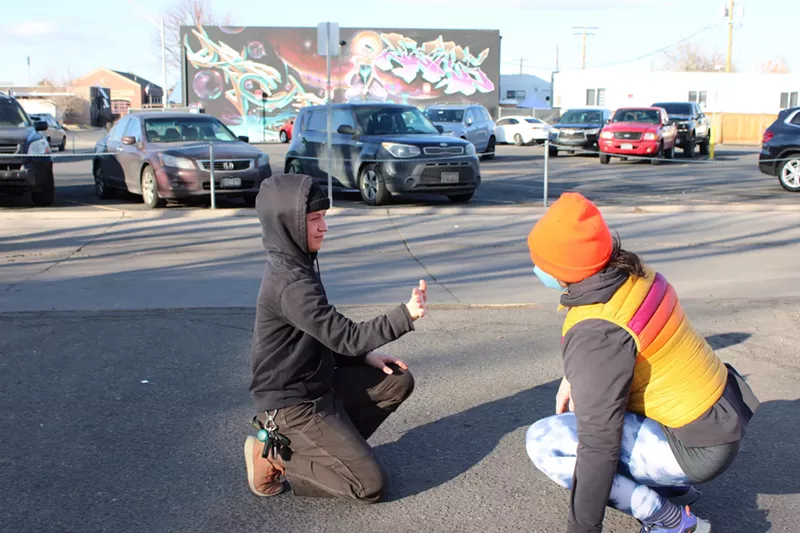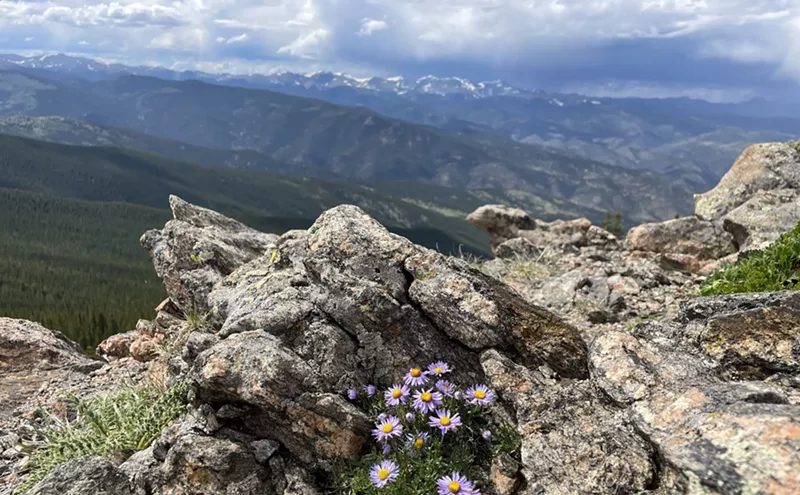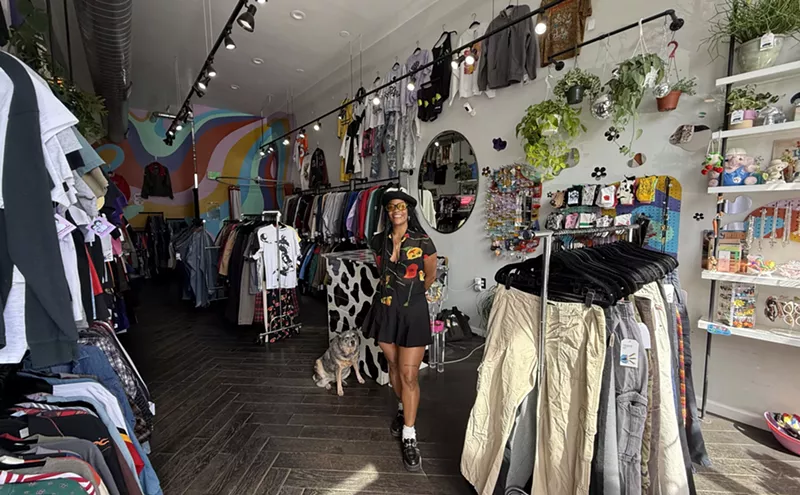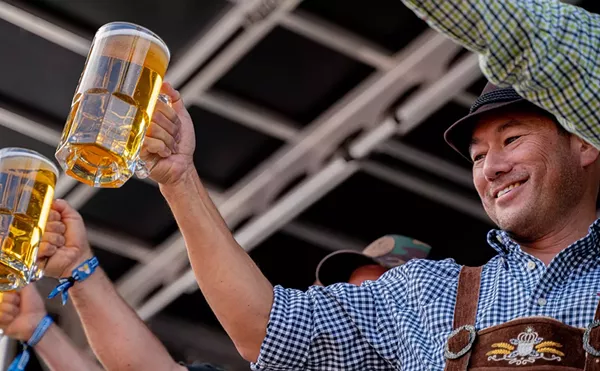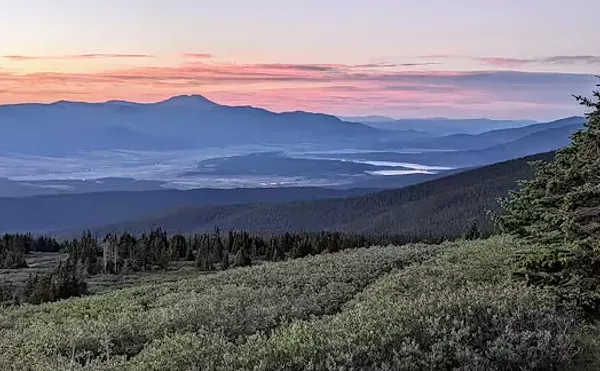Colfax Avenue is more than just Denver’s longest street — it is a living organism, a battleground of histories and a stage where the city’s most marginalized voices have fought to be heard. Field Trip, the latest experimental work from Control Group Productions, allows Colfax to direct the performance itself.
"When Stevie [Gunter] and I decided to work on this project together, we clarified that Colfax is the director more than us, which I think is going to be the tricky dance of this project," says project collaborator George Delaney. "Holding nobody in charge fully while also everybody leaning into their responsibility and their roles, whether it's participants or contributing artists, everybody being safe and cared for. Also, centered on Theatre of the Oppressed, we talked about what that brings up and how it impacts the physical work we're interested in with more dance and music backgrounds."
This world premiere, unfolding over nearly three months, is not a traditional play or dance show but rather an evolving, participatory experience. It invites audiences to take on the roles of witnesses, players and agitators, blurring the distinction between spectatorship and activism.
The piece, which is divided into three sections: Assembly (on February 8, March 2 and 20), Recess (March 29 and April 12) and Field Trip! (April 26 and 27), investigates movement, memory and resistance. Field Trip was inspired by Caroline Sharkey, a member of the admin team at Control Group, and their wish to create a performance centered on the motels on Colfax. Sharkey, who is currently dancing in Berlin, was unable to participate in the project, so Delaney and Gunter took the lead.
"The desire was still for Colfax to be the subject, so George and I, in October-ish, were brainstorming what we wanted to do with Colfax," Gunter says. "The clearest, easiest and simplest answer was getting people who have a relationship to Colfax to make work that they've just been wanting to make. We wanted to give people an excuse to explore Colfax and interact with all the themes that ground our understanding of Colfax, which includes its blackness, brownness, madness, disobedience and disorganization."
To start, Delaney circled us up and introduced the concept. The first half would take place indoors, followed by a break before venturing onto East Colfax. He introduced the musicians and the “Jokers” — group leaders responsible for guiding our journey — and emphasized a core tenet of the experience: "Everything is optional," Delaney said. “Say no to us if you want."
The session began with a ten-minute somatic shaking exercise, a full-body release set to music, followed by walking around the space, a guided breathing activity and more walking. Drawing on Augusto Boal's Theatre of the Oppressed techniques, Delaney explained that we would be playing group games in which pairs would lead and follow each other's movements, with their gestures captured on cell-phone cameras.
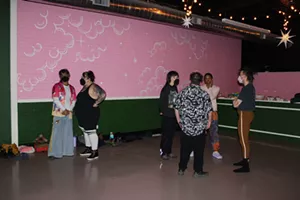
As roles were switched, the power dynamics between leader and follower subtly shifted, mirroring larger societal structures. Following that, we moved on to a mirroring activity that started with one person leading, then switched, and ended in a dance in which neither person was clearly leading or following. During the break after these exercises, the energy in the room changed — there was more laughter, more conversation and a growing sense of community.
Then, the real challenge began: taking the work onto Colfax. Stepping onto the street transformed the performance from an introspective exercise into a public confrontation. Our group began moving through the neighborhood, playing with mirroring and leading exercises.
At one point, a young boy ran up to us, curiosity lighting up his face. “What are you doing?” he asked. “They’re dancing,” Delaney answered. Without hesitation, the boy replied, “Oh, okay. I’m doing ninja kicks.” So, for a moment, we did ninja kicks together, an unscripted moment of connection in which Colfax shaped the performance in real-time. This spontaneous exchange encapsulated Field Trip's mission: to disrupt the mundane with moments of joy, disobedience and radical presence.
As the group continued its movement through East Colfax, interactions with the public became increasingly layered, shifting between curiosity, amusement and the occasional sideways glance. The act of embodying disobedience highlighted the thin boundary between performance and everyday life. The cityscape itself became a collaborator, influencing and responding to the work in ways that could never be scripted.
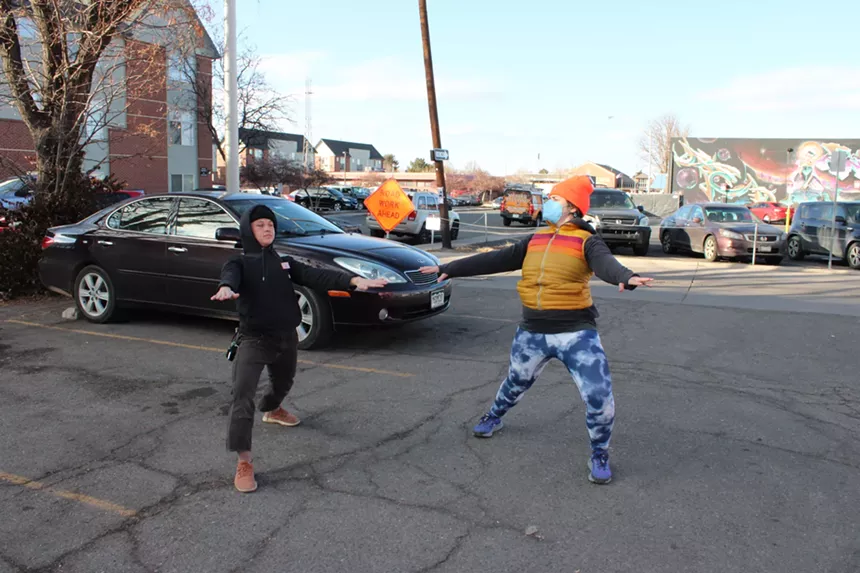 Back inside Manos Sagrados, the session concluded with a debrief, offering space for participants to reflect on the experience. Many expressed appreciation for the way each exercise built upon the last, gradually dissolving barriers between performer and spectator. I expressed a desire for more historical context and inquired about the building they had occupied: Who owns it? What was here before? How does this particular space fit into the broader story of Colfax? Others asked about the land before colonization.
Back inside Manos Sagrados, the session concluded with a debrief, offering space for participants to reflect on the experience. Many expressed appreciation for the way each exercise built upon the last, gradually dissolving barriers between performer and spectator. I expressed a desire for more historical context and inquired about the building they had occupied: Who owns it? What was here before? How does this particular space fit into the broader story of Colfax? Others asked about the land before colonization.
For Delaney and Gunter, these reflections are not just feedback but essential fuel for the project’s next phases. With two more Assembly segments ahead, followed by the Recess and Field Trip! events, the work will continue to evolve. “The next two parts are going to be heavily informed by the next two Assembly gatherings,” Gunter explains. “We’re experimenting, building a language together and the way we move through Colfax will shift accordingly.”
The project resists easy categorization. It is theater, but also dance. It is movement work, but also an exploration of urban space. It is activism, but also play. With each phase, the experiential work builds on the previous one. The second installment, Recess, will expand the experience into a party-like format. Finally, Field Trip! will fully immerse participants in East Colfax, testing the boundaries between art and daily life.
"I’m still processing how I’m feeling," Delaney said in a conversation after the first Assembly. "I have questions. How do we encourage people to put sense into their autonomy at all times and let them know that everything is an invitation? We want to prompt people to really investigate a certain invitation and not just throw it out or accept it immediately. What would it look like if during the games people stopped following my hand? After people get to know the rules of the games we teach, what happens if they break them? That’s one of the things that I’m interested in going further on. Our next public experiment isn't until March 2, so we have about a month … The second experiment's going to feel a lot different."
Choosing the right space for Field Trip was an intentional decision. Control Group has a studio in Lakewood that could have served as a home (or at least rehearsal space) for the project, but Delaney and Gunter felt strongly that the work needed to be created and performed in the environment it was engaging with.
“Control Group has a studio in Lakewood that’s more or less free space that wouldn't take any money out of our project budget,” Delaney explains. “But it felt very important that we’re not working over there and then bringing something here. We need to be working where the work is living. We have money coming out of the budget that’s going to Manos, and also that’s an investment in the community.”
Manos Sagrados' role as an independent venue and community space aligned with the team's ethos of centering collective experimentation. The venue's location on East Colfax, a corridor long associated with migration, displacement and resistance, made it an important collaborator in the performance's unfolding narrative.
"We kind of started with Colfax just directing us," Gunter says. "To decide where along Colfax and what part of the corridors to center, we drove with Patrick [Mueller, Control Group's artistic director] one day up and down Colfax and just like pointed out spots that we thought were cool. We thought about pre-existing relationships that we have with Bruce Trujillo at Manos Sagrados, and that this is a really important part of Colfax, so it seemed like a good fit."
With Field Trip set to evolve in the coming months, the collaborators are thinking about what it means to create a participatory, site-responsive work that is constantly changing in structure and form. Delaney framed the piece in terms of movement, both physically and politically.
“One of the things I said at the very beginning of working on this project was that I wanted to center movement,” Delaney says. “By that, I mean movement as in moving our bodies, dancing and somatic work that will help us tune into our own bodies and how that work isn't separate from movement, as in movements of organizing around cultural collective change."
Field Trip events will continue through Sunday, April 27, at and around Manos Sagrados, 9975 East Colfax Avenue in Aurora. Learn more at controlgroupproductions.org.
"When Stevie [Gunter] and I decided to work on this project together, we clarified that Colfax is the director more than us, which I think is going to be the tricky dance of this project," says project collaborator George Delaney. "Holding nobody in charge fully while also everybody leaning into their responsibility and their roles, whether it's participants or contributing artists, everybody being safe and cared for. Also, centered on Theatre of the Oppressed, we talked about what that brings up and how it impacts the physical work we're interested in with more dance and music backgrounds."
This world premiere, unfolding over nearly three months, is not a traditional play or dance show but rather an evolving, participatory experience. It invites audiences to take on the roles of witnesses, players and agitators, blurring the distinction between spectatorship and activism.
The piece, which is divided into three sections: Assembly (on February 8, March 2 and 20), Recess (March 29 and April 12) and Field Trip! (April 26 and 27), investigates movement, memory and resistance. Field Trip was inspired by Caroline Sharkey, a member of the admin team at Control Group, and their wish to create a performance centered on the motels on Colfax. Sharkey, who is currently dancing in Berlin, was unable to participate in the project, so Delaney and Gunter took the lead.
"The desire was still for Colfax to be the subject, so George and I, in October-ish, were brainstorming what we wanted to do with Colfax," Gunter says. "The clearest, easiest and simplest answer was getting people who have a relationship to Colfax to make work that they've just been wanting to make. We wanted to give people an excuse to explore Colfax and interact with all the themes that ground our understanding of Colfax, which includes its blackness, brownness, madness, disobedience and disorganization."
Taking it to Colfax
The inaugural Assembly session took place on February 8 at Manos Sagrados, an independent venue deeply embedded in the Aurora Cultural Arts District. From the outset, it was clear that this was no ordinary performance. Before the activities began, participants gathered to listen to a mix of recorded and live music while casually eating team-provided snacks such as apple slices and peanut butter, chips and salsa, and Girl Scout cookies.To start, Delaney circled us up and introduced the concept. The first half would take place indoors, followed by a break before venturing onto East Colfax. He introduced the musicians and the “Jokers” — group leaders responsible for guiding our journey — and emphasized a core tenet of the experience: "Everything is optional," Delaney said. “Say no to us if you want."
The session began with a ten-minute somatic shaking exercise, a full-body release set to music, followed by walking around the space, a guided breathing activity and more walking. Drawing on Augusto Boal's Theatre of the Oppressed techniques, Delaney explained that we would be playing group games in which pairs would lead and follow each other's movements, with their gestures captured on cell-phone cameras.

This world premiere, which takes place over nearly three months, invites audiences to play the roles of witnesses, players and agitators, blurring the line between spectatorship and activism.
Courtesy of Toni Tresca
As roles were switched, the power dynamics between leader and follower subtly shifted, mirroring larger societal structures. Following that, we moved on to a mirroring activity that started with one person leading, then switched, and ended in a dance in which neither person was clearly leading or following. During the break after these exercises, the energy in the room changed — there was more laughter, more conversation and a growing sense of community.
Then, the real challenge began: taking the work onto Colfax. Stepping onto the street transformed the performance from an introspective exercise into a public confrontation. Our group began moving through the neighborhood, playing with mirroring and leading exercises.
At one point, a young boy ran up to us, curiosity lighting up his face. “What are you doing?” he asked. “They’re dancing,” Delaney answered. Without hesitation, the boy replied, “Oh, okay. I’m doing ninja kicks.” So, for a moment, we did ninja kicks together, an unscripted moment of connection in which Colfax shaped the performance in real-time. This spontaneous exchange encapsulated Field Trip's mission: to disrupt the mundane with moments of joy, disobedience and radical presence.
As the group continued its movement through East Colfax, interactions with the public became increasingly layered, shifting between curiosity, amusement and the occasional sideways glance. The act of embodying disobedience highlighted the thin boundary between performance and everyday life. The cityscape itself became a collaborator, influencing and responding to the work in ways that could never be scripted.

Field Trip is divided into three sections that explore movement, memory and resistance.
Courtesy of Toni Tresca
For Delaney and Gunter, these reflections are not just feedback but essential fuel for the project’s next phases. With two more Assembly segments ahead, followed by the Recess and Field Trip! events, the work will continue to evolve. “The next two parts are going to be heavily informed by the next two Assembly gatherings,” Gunter explains. “We’re experimenting, building a language together and the way we move through Colfax will shift accordingly.”
The project resists easy categorization. It is theater, but also dance. It is movement work, but also an exploration of urban space. It is activism, but also play. With each phase, the experiential work builds on the previous one. The second installment, Recess, will expand the experience into a party-like format. Finally, Field Trip! will fully immerse participants in East Colfax, testing the boundaries between art and daily life.
"I’m still processing how I’m feeling," Delaney said in a conversation after the first Assembly. "I have questions. How do we encourage people to put sense into their autonomy at all times and let them know that everything is an invitation? We want to prompt people to really investigate a certain invitation and not just throw it out or accept it immediately. What would it look like if during the games people stopped following my hand? After people get to know the rules of the games we teach, what happens if they break them? That’s one of the things that I’m interested in going further on. Our next public experiment isn't until March 2, so we have about a month … The second experiment's going to feel a lot different."
Choosing the right space for Field Trip was an intentional decision. Control Group has a studio in Lakewood that could have served as a home (or at least rehearsal space) for the project, but Delaney and Gunter felt strongly that the work needed to be created and performed in the environment it was engaging with.
“Control Group has a studio in Lakewood that’s more or less free space that wouldn't take any money out of our project budget,” Delaney explains. “But it felt very important that we’re not working over there and then bringing something here. We need to be working where the work is living. We have money coming out of the budget that’s going to Manos, and also that’s an investment in the community.”
Manos Sagrados' role as an independent venue and community space aligned with the team's ethos of centering collective experimentation. The venue's location on East Colfax, a corridor long associated with migration, displacement and resistance, made it an important collaborator in the performance's unfolding narrative.
"We kind of started with Colfax just directing us," Gunter says. "To decide where along Colfax and what part of the corridors to center, we drove with Patrick [Mueller, Control Group's artistic director] one day up and down Colfax and just like pointed out spots that we thought were cool. We thought about pre-existing relationships that we have with Bruce Trujillo at Manos Sagrados, and that this is a really important part of Colfax, so it seemed like a good fit."
With Field Trip set to evolve in the coming months, the collaborators are thinking about what it means to create a participatory, site-responsive work that is constantly changing in structure and form. Delaney framed the piece in terms of movement, both physically and politically.
“One of the things I said at the very beginning of working on this project was that I wanted to center movement,” Delaney says. “By that, I mean movement as in moving our bodies, dancing and somatic work that will help us tune into our own bodies and how that work isn't separate from movement, as in movements of organizing around cultural collective change."
Field Trip events will continue through Sunday, April 27, at and around Manos Sagrados, 9975 East Colfax Avenue in Aurora. Learn more at controlgroupproductions.org.

